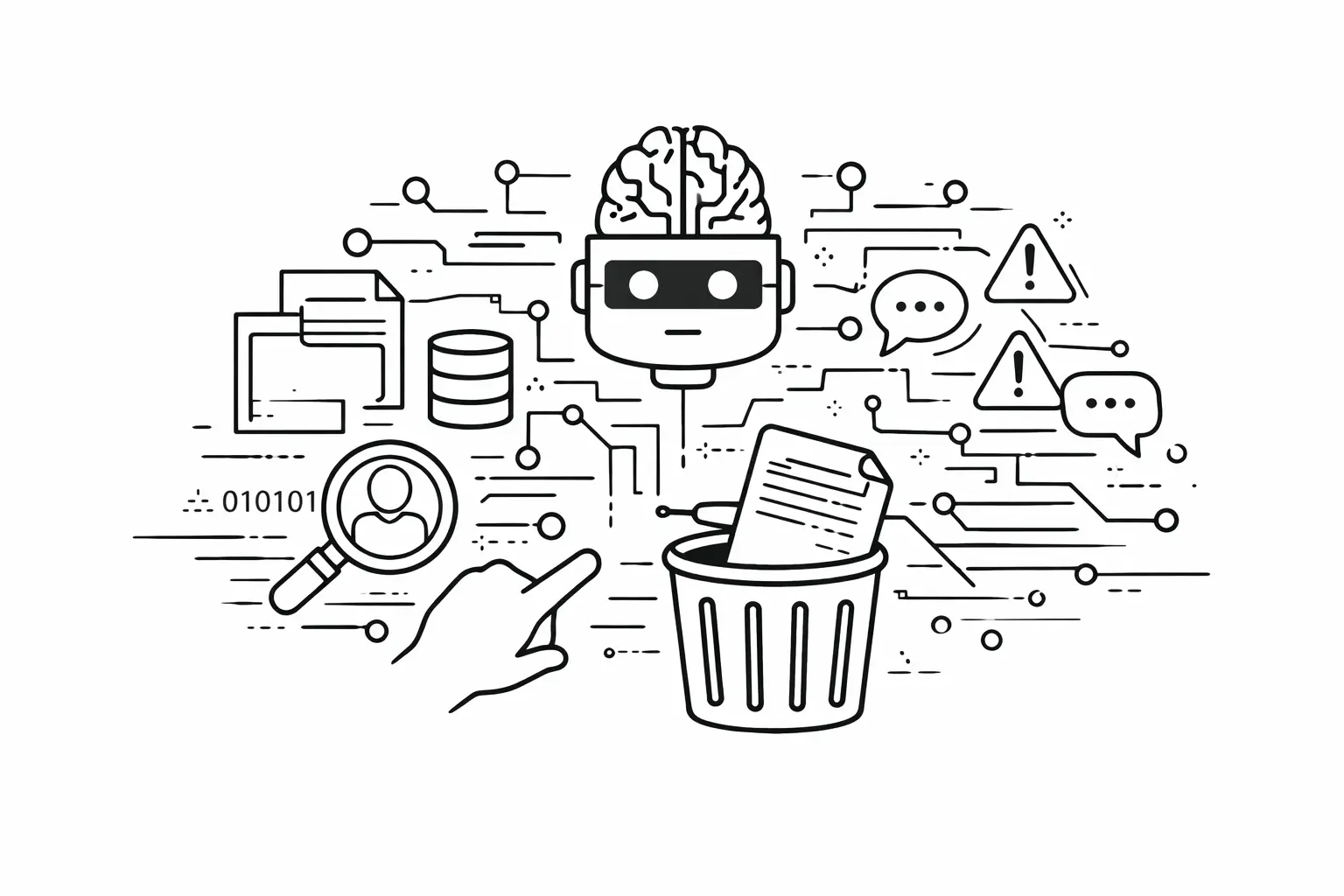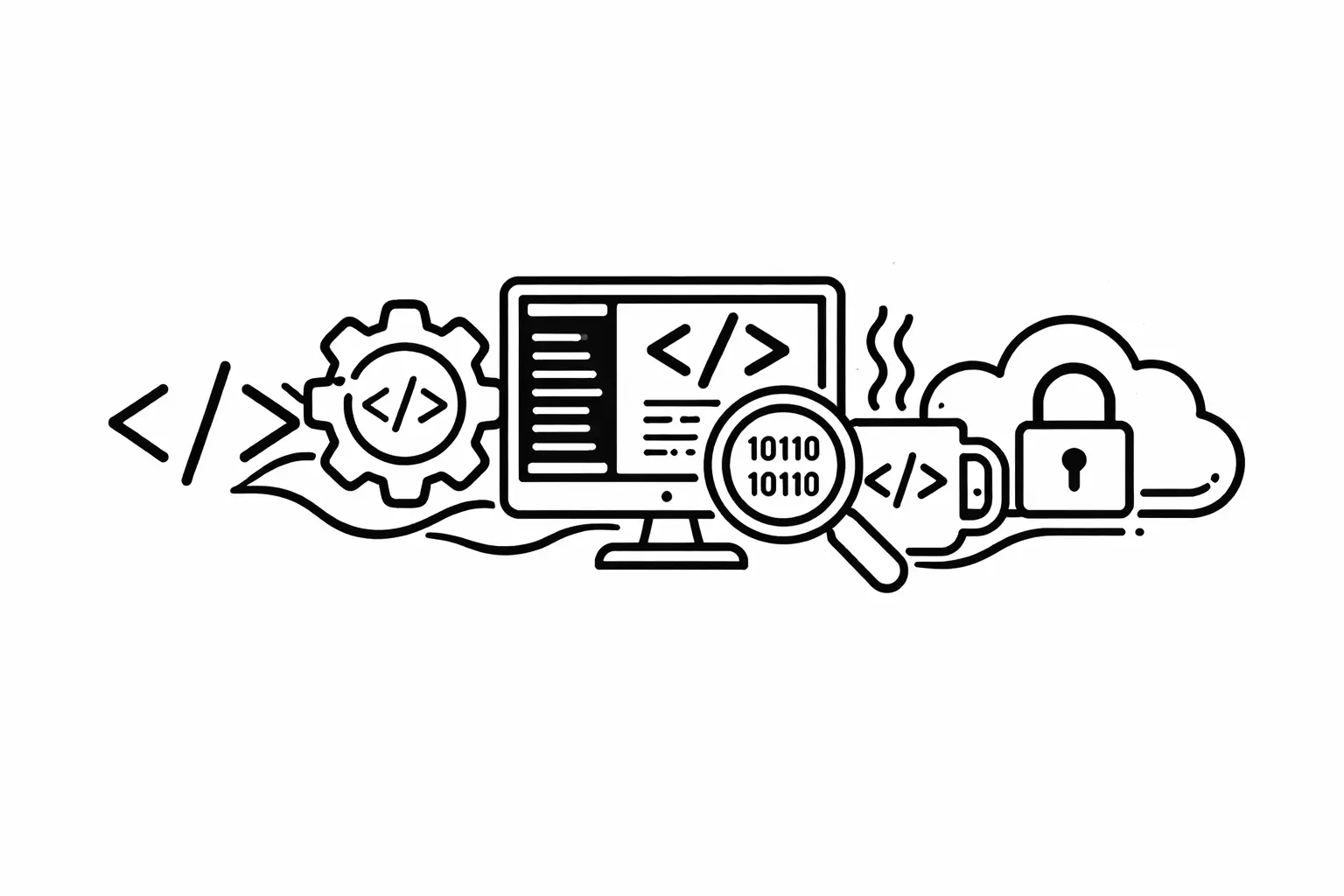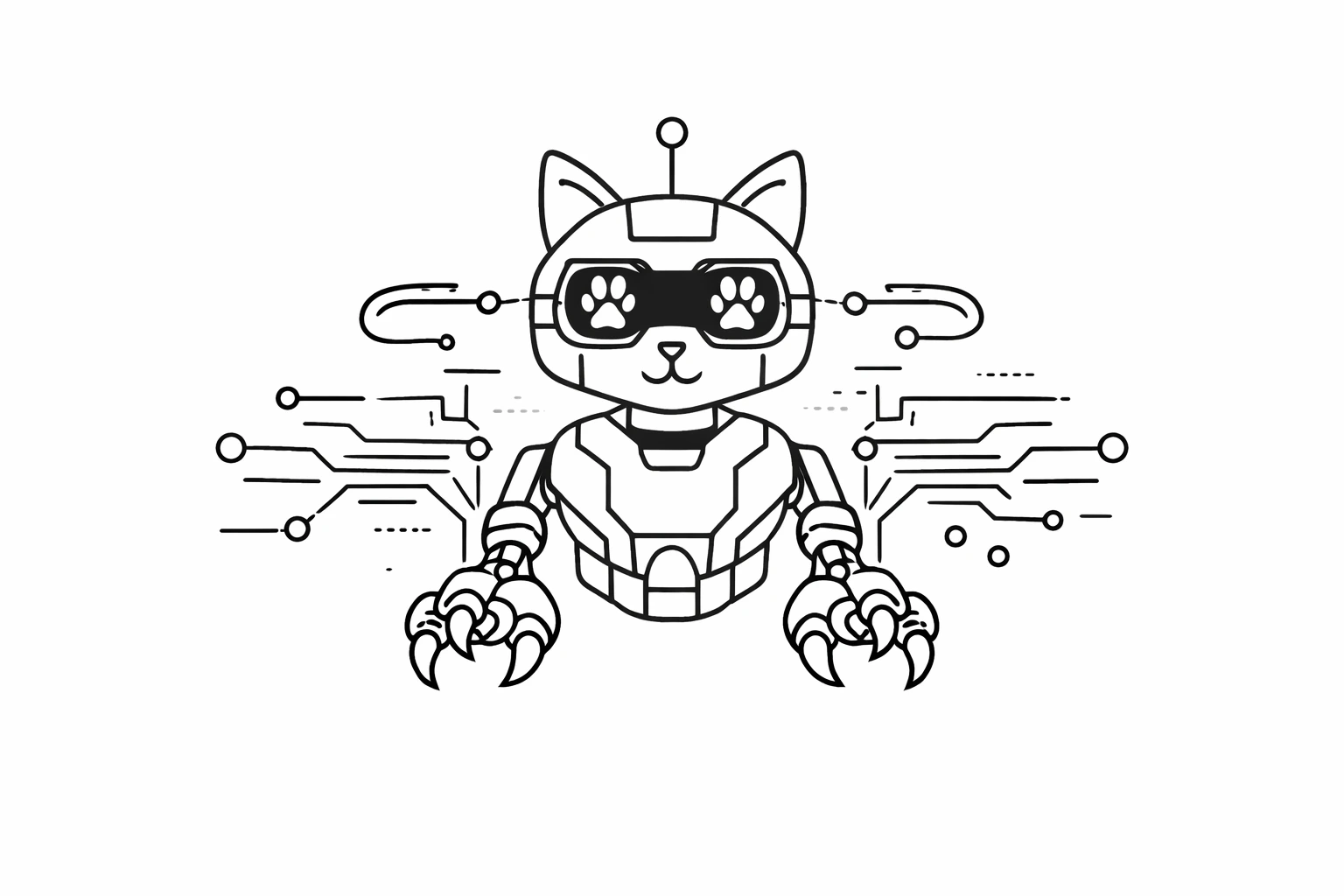Introducing ChatGPT 5.1: Here's Everything You Need to Know

OpenAI just dropped ChatGPT 5.1, and if you've been using ChatGPT regularly, you're about to notice some serious changes in how it talks to you.
This isn't just another version bump.
GPT-5.1 fundamentally changes how the AI responds—making it warmer, smarter, and way better at actually following what you ask it to do.
Let me walk you through what's new and why it matters.
ALSO READ: 10 Claude AI Response Error and How to Fix Them
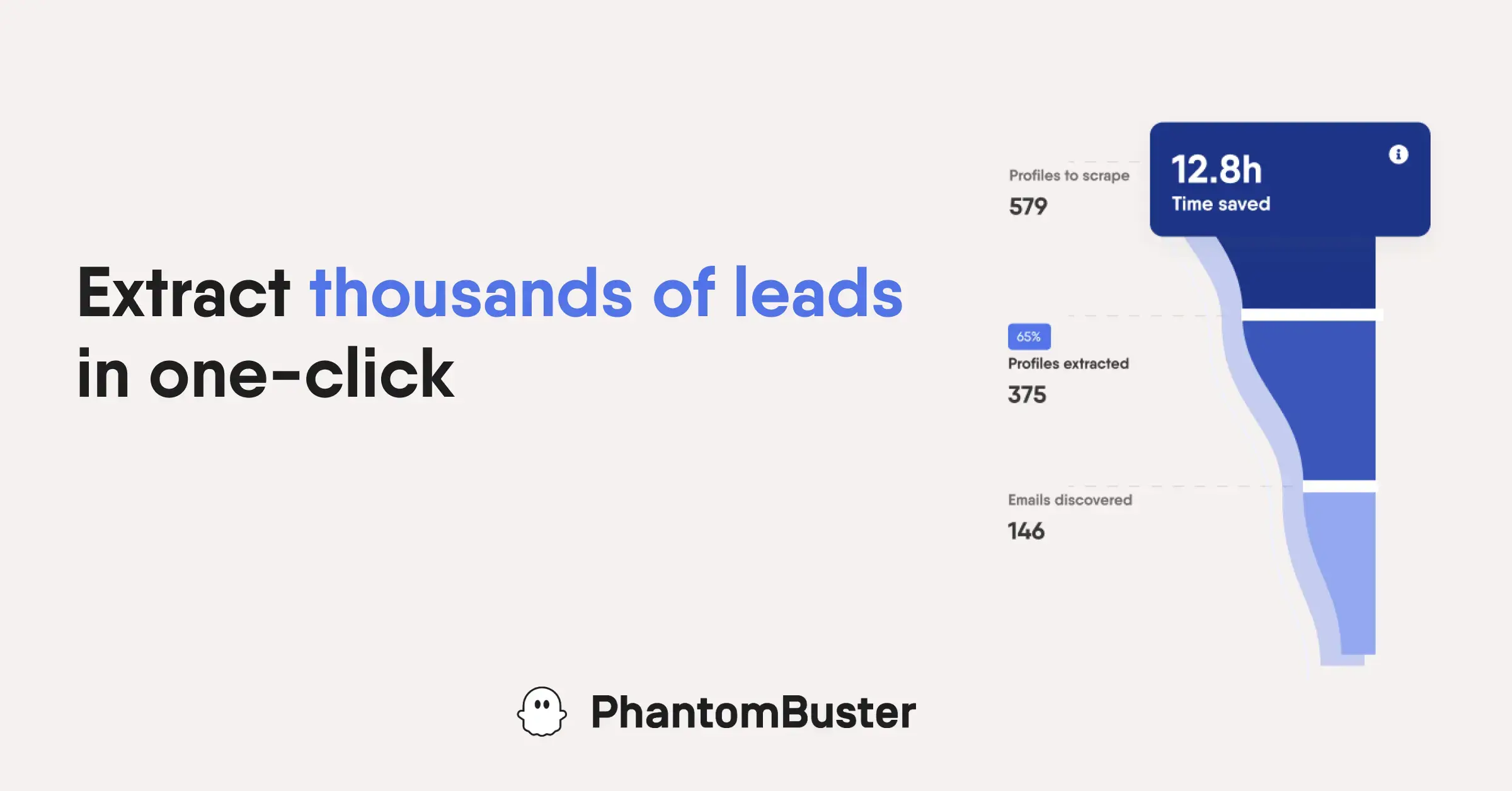
What's Actually New in GPT-5.1
OpenAI released two upgraded models under the GPT-5.1 umbrella:
GPT-5.1 Instant – This is the model most people use daily. It's now more conversational and better at understanding your instructions.
GPT-5.1 Thinking – This is the advanced reasoning model that handles complex problems. It now adjusts how long it thinks based on how hard your question is.
Both models got smarter. But more importantly, they got better at sounding human.
GPT-5.1 Instant: Your New Conversational Assistant
It Actually Sounds Like a Person Now

The biggest change? GPT-5.1 Instant is warmer and more playful by default.
Previous versions felt robotic.
They gave you information, but conversations felt stiff. GPT-5.1 changes that.
Here's an example. When someone asked for stress relief tips, the old GPT-5 gave a structured list with emojis but felt clinical.
GPT-5.1 Instant responded like a friend who actually cares—asking about your specific situation and tailoring advice to you.
The difference is subtle but powerful. You'll notice it immediately when you start chatting.
It Finally Follows Your Instructions
Remember asking ChatGPT to "respond in six words" and getting a paragraph anyway? That's fixed.
GPT-5.1 Instant dramatically improved instruction following.
If you ask for six words, you get six words. If you want bullet points, you get bullet points.
This seems basic, but it's been one of the most frustrating parts of using AI. OpenAI finally nailed it.
Adaptive Reasoning Makes It Smarter
Here's something technical that matters: GPT-5.1 Instant can now decide when to think before responding.
For simple questions, it answers fast. For complex ones, it takes a moment to reason through the answer properly.
This shows up in real performance gains.
The model improved significantly on math tests (AIME 2025) and coding challenges (Codeforces).
You won't see those benchmark names in your daily use, but you'll notice the AI makes fewer mistakes on hard problems.
GPT-5.1 Thinking: The Smart Model Got Faster and Clearer
It Adapts Its Thinking Time
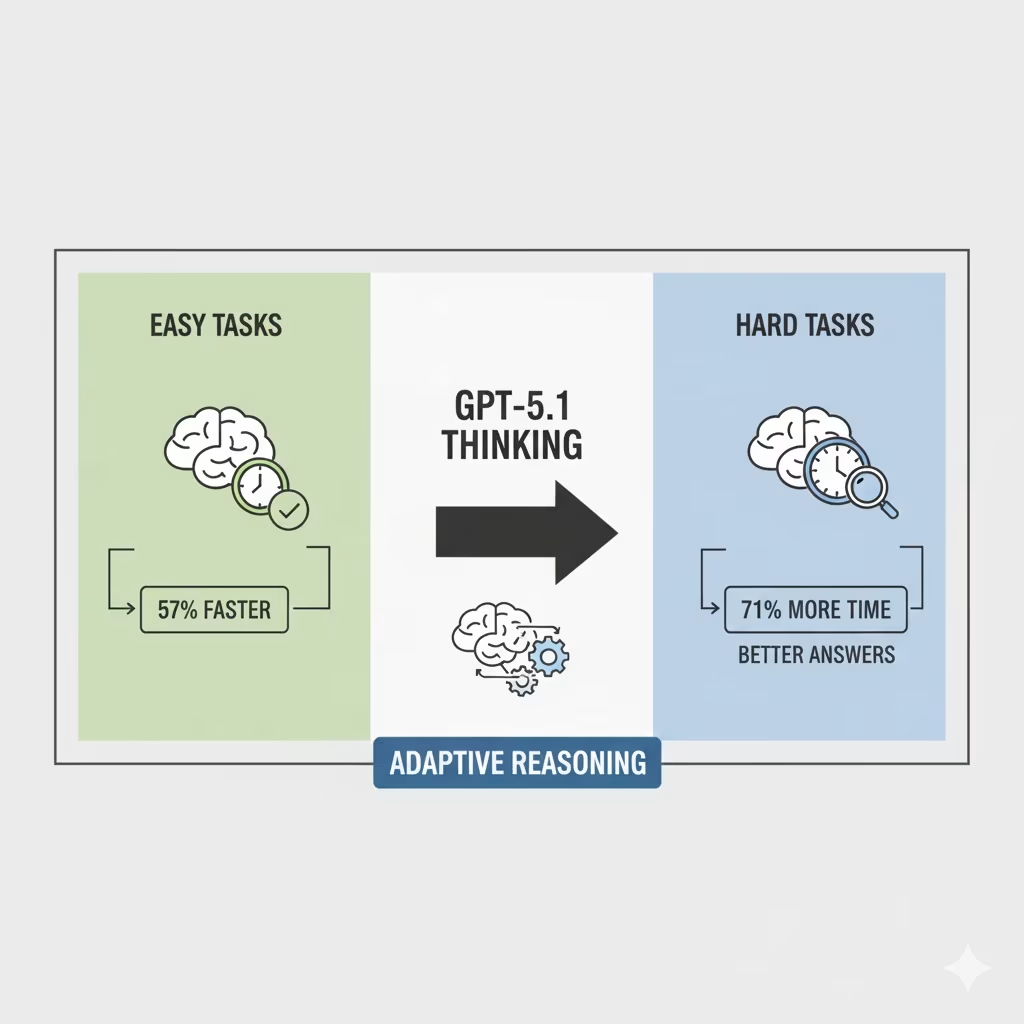
The advanced reasoning model—GPT-5.1 Thinking—now adjusts how long it spends on your question.
On easy tasks, it's 57% faster than before. On hard tasks, it spends 71% more time thinking through the problem.
That means less waiting for simple questions and better answers for complex ones.
It Explains Things Like a Human
Technical jargon was a huge problem with GPT-5 Thinking. It would use undefined terms and complex language that made responses hard to follow.
GPT-5.1 Thinking explains things more clearly. Less jargon.
Better structure.
Concepts you can actually understand without a PhD.
Look at how it explains baseball statistics like BABIP and wRC+.
The old version gave you formulas and technical breakdowns.
The new version explains it like your friend who happens to know a lot about baseball.
That's the difference.
Warmer Responses for Personal Questions
GPT-5.1 Thinking also got better at empathy.
When someone spilled coffee before a meeting and asked if everyone thought they were an idiot, the old version gave practical advice but felt detached.
GPT-5.1 Thinking responded like a friend—reassuring, direct, and actually helpful emotionally.
This matters more than you'd think.
AI isn't just for work tasks.
People use it for advice, emotional support, and decision-making.
Having an AI that responds with warmth makes those conversations actually useful.
New Personalization Options Let You Shape How ChatGPT Talks
OpenAI added new ways to control ChatGPT's personality.
You can now choose from these base styles:
- Default – Balanced tone
- Professional – Polished and precise
- Friendly – Warm and chatty
- Candid – Direct and encouraging
- Quirky – Playful and imaginative
- Efficient – Concise and plain
- Nerdy – Exploratory and enthusiastic
- Cynical – Skeptical and blunt
These aren't just cosmetic changes. They actually affect how the AI structures responses, chooses words, and approaches your questions.
Fine-Tune Individual Characteristics

Beyond presets, OpenAI is testing something even more granular: adjusting specific traits.
You'll be able to control:
- How concise responses are
- How warm the tone feels
- How scannable the formatting is
- How often it uses emojis
ChatGPT can even notice when you keep asking for a certain style and offer to update your settings automatically.
This is rolling out gradually, starting with a small group of users. But it's coming to everyone soon.
Settings Now Apply Instantly
Before, if you changed your personalization settings, they only affected new conversations.
Ongoing chats kept the old style.
Now? Settings apply immediately across all your chats.
That includes conversations already in progress.
Small change, but it makes the experience way smoother.
Who Gets Access and When
GPT-5.1 is rolling out now, starting with paid users (Plus, Pro, Go, Business, Enterprise, and Edu plans).
Free users and logged-out users will get access shortly after.
Enterprise and Edu plans get a seven-day early access toggle that's off by default.
After that window closes, GPT-5.1 becomes the standard model for everyone.
OpenAI is rolling this out gradually over the next few days to keep servers stable. If you don't see it today, check back tomorrow.
API Access Coming This Week
Developers get both models through the API later this week:
- GPT-5.1 Instant – Available as gpt-5.1-chat-latest
- GPT-5.1 Thinking – Available as GPT-5.1in the API
Both versions include adaptive reasoning in the API, which means your apps can benefit from the same smart thinking adjustments users get in ChatGPT.
GPT-5 Sticks Around for Three Months
The old GPT-5 models (both Instant and Thinking) will remain available under the legacy models dropdown for paid subscribers for three months.
This gives you time to compare versions and adapt workflows without pressure.
Other legacy models aren't affected by this timeline.
OpenAI says they'll communicate sunset periods clearly in the future, with plenty of advance notice.
Why This Update Matters
GPT-5.1 isn't just faster or smarter—it's more usable.
The biggest complaint about AI assistants has always been that they feel robotic.
They give you information, but conversations feel awkward. You have to repeat yourself. They ignore instructions. They sound stiff.
GPT-5.1 fixes most of that.
The warmth in responses makes conversations feel natural.
The improved instruction following means you waste less time fighting with the AI.
The adaptive reasoning means fewer mistakes on hard problems and faster answers on easy ones.
And the personalization options mean you can finally shape ChatGPT into something that actually fits how you work and think.
How to Try It Now
If you're a paid ChatGPT user, check your model selector.
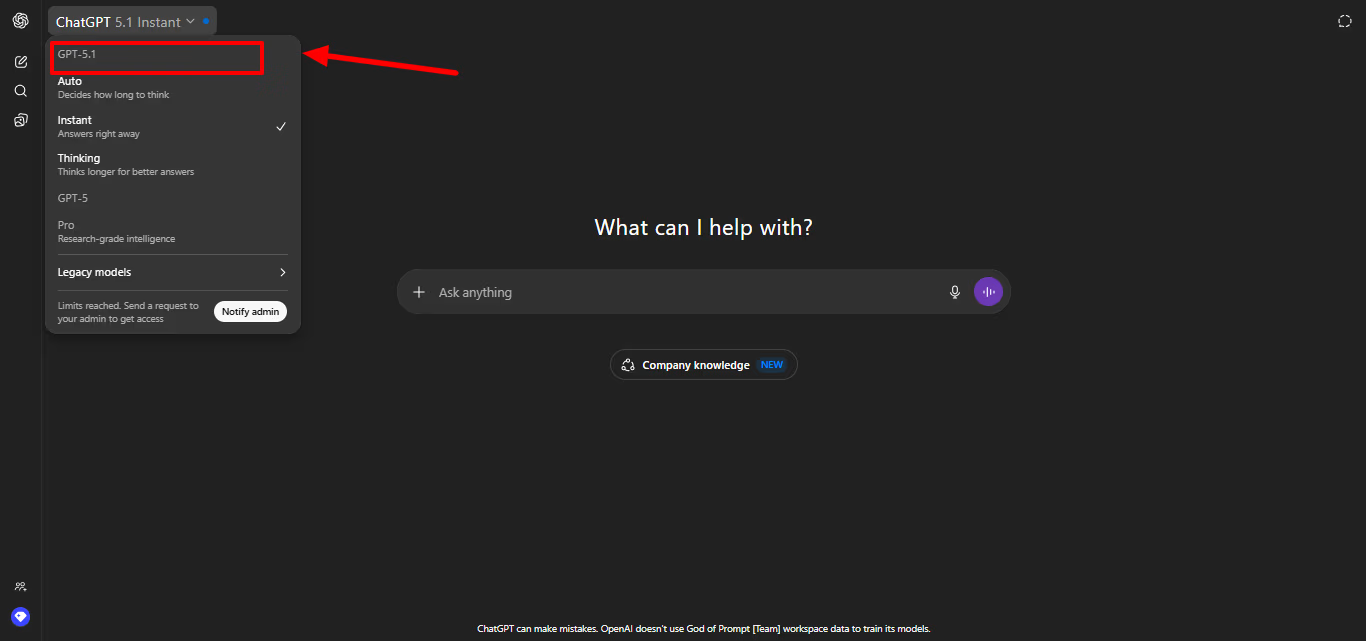
You should see GPT-5.1 Instant and GPT-5.1 Thinking rolling out over the next few days.
Try asking it complex questions and compare responses to GPT-5.
Ask it to follow specific instructions—like "respond in exactly 10 words" or "give me three bullet points with no introduction."
Test the personality settings. Switch between Professional and Quirky on the same question and see how dramatically the tone shifts.
You'll notice the difference immediately.
What's Coming Next
OpenAI says this is just the beginning.
They're continuing to improve along these same dimensions: smarter models, warmer responses, better customization.
GPT-5.1 sets a new baseline for what AI conversations should feel like.
And based on OpenAI's track record, the next version will push even further.
For now, GPT-5.1 is the most human-sounding, instruction-following, and genuinely useful version of ChatGPT yet.
If you haven't tried it, you're missing out.














